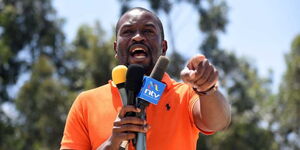Amid the push to oust Deputy President Rigathi Gachagua, a Member of Parliament has threatened to present a motion changing the process of impeachment for Presidents, Deputy Presidents, and Governors.
Manyatta MP Gitonga Mukunji is advocating for amendments that would require a referendum before any elected leader can be removed from office. This proposal aims to empower voters, ensuring that the decision to impeach rests with the electorate rather than a small group of lawmakers.
Mukunji's motivation is rooted in the ongoing turmoil surrounding Meru Governor Kawira Mwangaza, who has faced intense political pressure from a minority of lawmakers seeking her removal. He argues that it is fundamentally unjust for a leader elected by millions to be subjected to the whims of a few “selfish leaders.”
According to Mukunji, the current impeachment process is susceptible to misuse, with lawmakers often exploiting it to settle personal grievances. “When someone is being impeached, the voters should have the final say,” he asserted, advocating for a system that genuinely reflects the will of the people.
Under current law, the Constitution permits the impeachment of Governors and their deputies if a majority of Members of County Assembly (MCAs) support the motion, which subsequently advances to the Senate.
Mukunji's proposal seeks to shift this balance of power by mandating a referendum that engages voters directly, ensuring their voices resonate in significant political decisions. If successful, this reform could redefine the relationship between elected officials and their constituents, transforming the impeachment process into a more democratic and participatory affair.
The proposal arrives at a critical juncture, as public trust in elected leaders continues to wane, with many citizens feeling overlooked and neglected by those in power. Mukunji’s emphasis on voter engagement resonates with a growing sentiment among Kenyans who demand more accountability from their leaders. By ensuring that the electorate has a say in impeachment matters, the proposed changes could lead to greater transparency and foster a sense of ownership among citizens regarding their governance.
Public participation has emerged as a contentious issue, particularly in light of the impeachment motion against Gachagua. On October 2, the High Court mandated that Parliament conduct a second round of public consultations, highlighting the importance of genuinely engaging Kenyans in the political process.
Justice Richard Mwongo underscored that public participation must be inclusive, transparent, and adequately communicated to ensure that all voices are heard. This ruling reinforces Mukunji’s call for reform, positioning it as a crucial step toward a more democratic system.
The chaos surrounding recent public participation events has exposed the need for clarity and structure in the impeachment process. By requiring a referendum, Mukunji’s proposal could eliminate the ambiguity that often accompanies impeachment motions and ensure that the voices of ordinary Kenyans are prioritised.
What the law says
The impeachment of the President, Deputy President, and Governors is governed by the Constitution and various statutes, primarily outlined in Articles 145 to 148. The process for impeaching the President or Deputy President is initiated in the National Assembly, where a motion must be tabled and supported by at least one-third of the members.
The grounds for impeachment include gross violation of the Constitution or any other law, committing a crime under national or international law, or misusing power. If the motion passes, the Senate takes over to conduct a trial. A two-thirds majority in the Senate is required for impeachment, ensuring a significant consensus before such a drastic action is taken.
For Governors, the impeachment process follows a similar route but is detailed in Article 181 of the Constitution. The process can be triggered by the County Assembly, which must pass a resolution supported by at least two-thirds of its members. Grounds for impeachment include a violation of the Constitution or any law, misusing power, and gross misconduct. Once the County Assembly votes to impeach, the matter is referred to the Senate for trial.
Similar to the national level, a two-thirds majority in the Senate is required to uphold the impeachment. These provisions ensure a balance between accountability and the protection of elected officials from arbitrary removal, reflecting Kenya’s commitment to democratic principles and rule of law.












